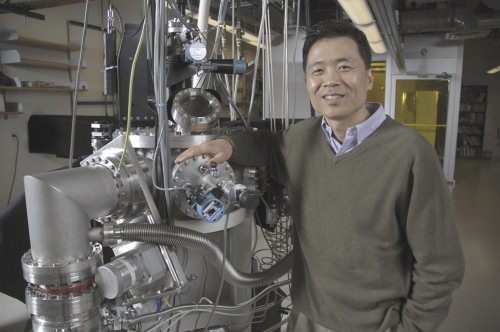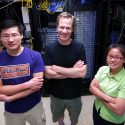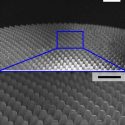White House puts materials initiative spotlight on UW–Madison research
Dane Morgan, a University of Wisconsin–Madison professor of materials science and engineering, joined researchers from around the country this week at the White House to celebrate five years of the Materials Genome Initiative (MGI).

Dane Morgan’s Informatics Skunkworks, launched with an NSF grant, is teaching undergraduate engineering students how to use cutting-edge computing tools to extract information . Photo courtesy of UW–Madison College of Engineering
President Barack Obama announced the Materials Genome Initiative in 2011 “to help businesses discover, develop, and deploy new materials twice as fast,” aiming to speed the path to lightweight cars, more efficient solar cells, tougher body armor and new spacecraft.
Federal agencies have invested more than $500 million in research and infrastructure to achieve that goal, creating both new materials and databases of materials for researchers to comb through in search of the properties that best fit their needs.
Ian Robertson, now dean of the UW–Madison College of Engineering, served as director of the National Science Foundation Division of Materials Research when the initiative was established and worked to guide the foundation’s support to researchers.
This week, the White House Office of Science and Technology Policy featured successful research at MGI’s anniversary meeting, including two initiative-funded projects at UW–Madison:
- Successfully combining computational modeling and experimentation helped a group led by Chang-Beom Eom, a UW–Madison professor of materials science and engineering, to create a new crystalline material that both conducts electricity like a metal and impedes the flow of electrons like an insulator. Combining contradictory properties in one material will help make devices that perform simultaneous electrical, magnetic and optical functions. The work is supported by NSF and Department of Energy grants.
- Morgan’s Informatics Skunkworks, launched with an NSF grant, is teaching undergraduate engineering students how to use cutting-edge computing tools to extract information — in this case, information like the patterns in the arrangement of atoms in fabricated nanomaterials — from vast pools of data. Skunkworks accelerates the educational experience by exposing undergraduates to research typically done by graduate students and to real-word problems offered up by industry partners.




